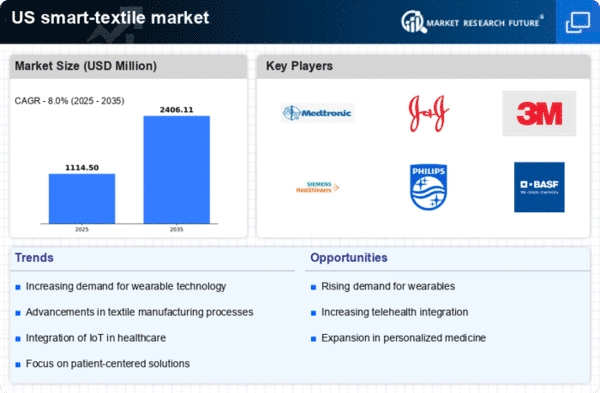Growing Awareness of Health and Wellness
There is a rising awareness of health and wellness among consumers, which is positively impacting the medical smart-textile market. As individuals become more health-conscious, the demand for products that promote well-being is increasing. Smart textiles that monitor health metrics and provide feedback on physical activity are particularly appealing to fitness enthusiasts and health-conscious consumers. The wellness market in the US is projected to exceed $4 trillion by 2026, indicating a robust potential for smart textiles that cater to this demographic. This growing awareness is likely to drive innovation and investment in the medical smart-textile market, as manufacturers seek to develop products that align with consumer preferences for health and wellness.
Rising Demand for Remote Patient Monitoring
The medical smart-textile market is experiencing a notable surge in demand for remote patient monitoring solutions. As healthcare systems increasingly prioritize telehealth and remote care, smart textiles equipped with sensors are becoming essential for continuous health monitoring. These textiles can track vital signs such as heart rate, temperature, and respiratory rate, providing real-time data to healthcare providers. The market for remote patient monitoring is projected to grow at a CAGR of approximately 25% over the next five years, indicating a robust opportunity for smart textile integration. This trend is particularly relevant in the context of an aging population in the US, where chronic conditions necessitate ongoing monitoring. Thus, the medical smart-textile market is poised to benefit significantly from this shift towards remote healthcare solutions.
Technological Innovations in Textile Manufacturing
Innovations in textile manufacturing technology are driving advancements in the medical smart-textile market. The introduction of advanced weaving techniques and the development of conductive fibers have enabled the creation of textiles that can seamlessly integrate electronic components. This evolution allows for the production of garments that not only provide comfort but also deliver critical health data. For instance, the incorporation of nanotechnology in fabric production enhances the functionality of smart textiles, making them more responsive and durable. The US market is witnessing a growing investment in research and development, with expenditures reaching approximately $1 billion annually. This investment is likely to yield new products that cater to the evolving needs of healthcare providers and patients alike, thereby expanding the medical smart-textile market.
Increased Focus on Personalized Healthcare Solutions
The medical smart-textile market is benefiting from a growing emphasis on personalized healthcare solutions. As patients increasingly seek tailored treatment options, smart textiles that adapt to individual health metrics are gaining traction. These textiles can be designed to respond to specific health conditions, providing customized feedback and interventions. The market for personalized healthcare is expected to reach $2 trillion by 2025, reflecting a significant opportunity for smart textiles that can deliver personalized data. This trend aligns with the broader shift towards patient-centered care in the US, where healthcare providers are looking for innovative ways to enhance patient engagement and outcomes. Consequently, the medical smart-textile market is likely to see substantial growth as it aligns with these personalized healthcare initiatives.
Regulatory Support for Innovative Healthcare Technologies
Regulatory support for innovative healthcare technologies is fostering growth in the medical smart-textile market. The US Food and Drug Administration (FDA) has been actively working to streamline the approval process for wearable health technologies, which includes smart textiles. This regulatory environment encourages manufacturers to invest in research and development, knowing that their products can reach the market more efficiently. The FDA's initiatives to promote innovation in medical devices are likely to enhance the competitiveness of the medical smart-textile market. As a result, companies are more inclined to explore new applications for smart textiles in healthcare, potentially leading to breakthroughs that could redefine patient care.
















